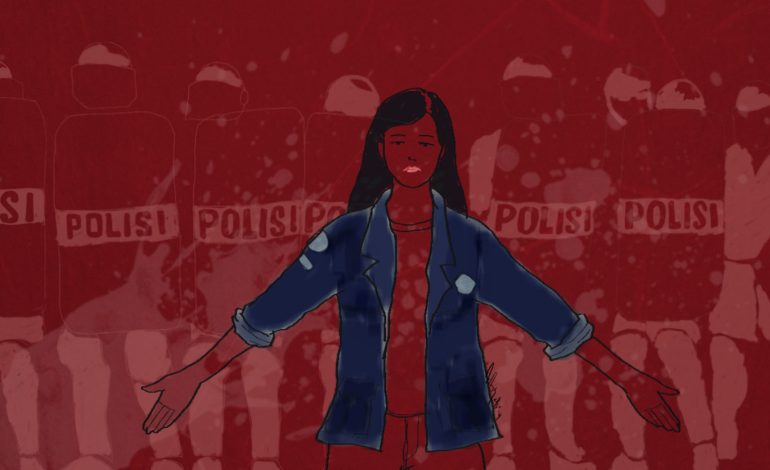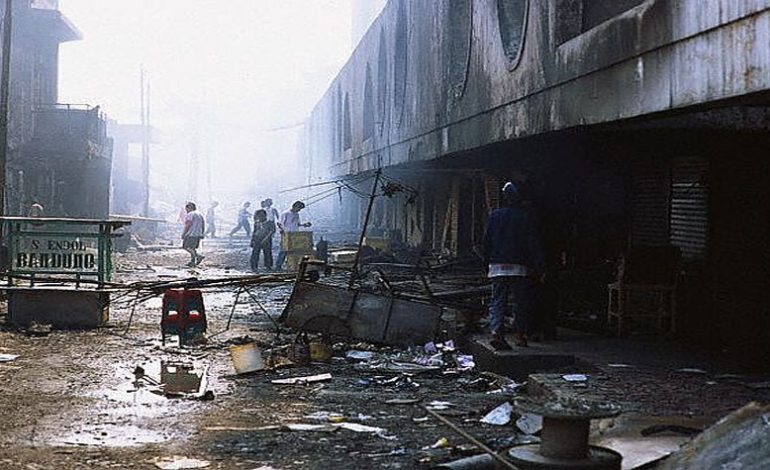May 1998 and How It Changed Me

The birth of a child is usually the highlight of a woman’s life and so it is with mine. But as for the most important milestone in my life, it is the turbulent days in May 1998 that has shaped me into who I am now.
That month has transformed me from an apolitical and ignorant young woman to a highly involved citizen. It has turned my aspiration from becoming a famous architect to an activist who works hard to help shape a better environment for her daughter.
I was still in university back in May 1998. I studied architecture, which means endless projects and assignments, so political activism was the least of my priority. I am also Chinese Indonesian and Catholic, a double minority, and from early on my parents had told us to avoid any hassle involving the government and politics to stay safe.
Tarumanegara University, the private university I attended, was nicknamed Shanghai or Peking, as the majority of students was, and still is, Chinese Indonesians. The only ‘political turbulence’ inside campus back then was when the boys from the engineering department had a brawl with each other. Political protest was a far fetch idea.
Even in early May 1998, when students of the nearby Trisakti University began to join the student protests, I didn’t budge. The students blocked our front entrance, and it was a nuisance for me who used public transportation. I had no empathy; I was just happy because my dad just raised my allowance.
At the height of the student protests on May 12, my two friends and I took the campus’ back exit to avoid the rallies on our way to our assignments in South Jakarta. While our fellow students at Trisakti were picketing the street where both campuses are located, the three of us were researching the stairs inside the Gran Mahakam Hotel.
Unaware of what was happening, I took an auto rickshaw back to my rented room near campus. The driver told me that something bad had happened, but I had so many things in mind that I did not pay any attention. I arrived safely, clueless as to what was going on just a kilometer from where I lived. I bumped into a housemate, a medical student who was in a rush. There had been shootings, she said, and she needed to be on standby at the clinic. This, finally, got my attention.
The other tenants in my boarding house waited anxiously for the medical student to come home. When she arrived at 10 p.m., shaking and on the verge of crying, she told us the stories from the hospital about students who were wounded and those who died. We never saw it coming. I felt something was changing inside me.
May 13
The next day, the headline on Kompas daily showed a huge picture of a girl on the street, lying among debris in a pool of what looked like blood (later we found out the girl was alive). It was surreal. Many of my friends decided to return to their hometowns. I managed to convince my parents that I would be safe.
Stupidly, I decided to do another site visit to the National Monument to finish my ‘Study on Stairs’ assignment. On the way back a friend texted me to say that all classes were canceled due to heightened tensions.
Along the way I saw many students from various universities in colorful almamater jackets marching to Trisakti to join a vigil. I picked up my jacket and decided to join the march. All of us were holding hands to form a barricade so that no other people like government informants would get inside. It felt cool to hold hand with strangers, I felt a bit patriotic.
Trisakti opened a small part of their gate, and they checked everyone before allowing us in. I didn’t have my student ID with me, but I managed to get through after I showed them the uni badge on my jacket and told them, ‘’Hey, we’re neighbors!”
Inside, people were giving orations. Donated food and water were flowing. But we could see the military presence outside the compound. All of a sudden, we saw military choppers flying very low. They fired teargas, filling the air with suffocating smog. It was a chaotic moment and one of the scariest moments of my life.
I ran and hid inside a building. My eyes were burning, and some girls told me to go to the toilet to wash my eyes with mineral water. There were lots of shots fired, and I heard an explosion outside. Later I found out it came from a gas station that was burned down.
There were no back entrances in Trisakti — all of the entrance/exit faced the main streets, which had been surrounded by people and the soldiers. My Nokia battery died, and I began to feel a real fear that my life was going to end soon. Amid sounds of shots, my instinct led me to the south wall of Trisakti, which separates Trisakti and Tarumanegara. My campus has several exits that lead to the small alleys connected to the main roads. Some students helped many people who wanted to leave the premise, including university staff. They used their body as steps so that we could climb the wall, and on the opposite side of the wall some Tarumanagara security officers and students helped us.
It was nearly 3 p.m. and the situation prevented me from going home with endless shots being fired out. I stayed inside the security post near the front entrance of my campus with other students. Every time a shot was fired, we instinctively lowered ourselves. I cried helplessly and the student next to me hugged me to calm me down.
There was no auto rickshaw at dusk when I decided to go home. The alleyways were empty and quiet with a backdrop of heavy smoke just north of it. It felt like the longest walk I ever took. The call of prayer from a nearby mosque calmed me a bit. Then I realized that someone was trailing me. It was a Trisakti student. He kept his distance as if he just wanted to watch me until I reached home. I took the pedestrian overpass and saw a truck and gas station still burning. All my housemates scolded me; one of them cried and hugged me when she found out I was safe.
The Toll
The whole scene snowballed into a full-scale riots in many parts of the city. The Topas shopping complex (now Roxy Mas Square) was burned down at night. We could hear some explosion and screaming from our rooftop. I couldn’t sleep at night. TVs and radios kept us informed, but we were in ground zero so the fear was heightened. Pasar Grogol, which was about 300 meters from our place, was heavily looted.
From May 14 onwards we could see smokes and fires from over 20 spots from our rooftop. When a reporter for Sonora Radio was reporting in a hospital, he nearly broke down with emotions. His report affected me more than any TV news report.
I checked my brother, who studied at Canisius High School in Central Jakarta. He lived in a rented room near the president’s house, so we figured it was safe for him there. I, however, couldn’t move out of the boarding house because it was dangerous to go out, as the burning and looting still continued. On the evening of May 14, the neighborhood leader called people to have a meeting to make an escape and safety plan. They told us students to wear university jacket even when we were sleeping. The men patrolled around the neighborhood at night, armed with samurais and blades.
The next day, on May 15, my parents called me a few times, because they heard rumors about gang rapes. As my mother cried, I wondered why I wasn’t as scared. But these were the darkest and desperate hours for us – my families, my friends and I. We knew that the riots had been triggered by bad political and economic condition, and as usual we, Chinese Indonesians, would always be easy targets.
Joining In
I hardly remembered how I survived the next few days. Three days later, we saw on the news that university students managed to occupy the House of the Representatives. I didn’t know what possessed me, but I went there with a friend. I thought, enough was enough, I didn’t want to stay silent anymore. I wanted to take part in the resilience, no matter how small my role is.
We took a bus, and we were the only passengers at the time. The bus driver looked amazed when he saw us. And so here we were, two girls with slanted eyes and fair skin, at the gate of Parliament building. It was packed with people, and none of them were Chinese. It was difficult to get inside the compound, since it was heavily guarded by students, but, luckily, a University of Indonesia student greeted us and helped us get inside.
It was raining and tense. But I couldn’t help feeling proud that I participated in this revolution. For the first time in my life, after endlessly being called “Hey, Cina” and other derogatory nicknames on the streets, I felt truly Indonesian. I completely forgot that I was a double minority, an ethnic Chinese and Catholic. We were all equal, chanting from the top of our lungs, “Reformasi! Reformasi Sampai Mati! (Reforms until the end)”
We came back the next day, this time with a camera and my boyfriend. We took some pictures inside the building. It was a happy moment, because finally Soeharto had decided to step down.
I retreated myself from Jakarta the next month because I had to have a knee surgery, so I could only follow the development on TV afterwards. But I was a changed person. I started to read many books about philosophy and history, especially the history of resistance. Somehow, I lost the appetite to become a famous architect. It just didn’t feel necessary anymore. Instead I became involved in a series of urban activism including with the NGO Rujak Center for Urban Studies that I co-founded and worked at.
I revisited the May 1998 story in 2011 when I was seven-month pregnant and finishing a chapter about that period for the book ‘Kata Fakta Jakarta (Words and Facts about Jakarta). It was really difficult to read the reports from the Joint Fact Finding Team (TGPF) and books about the May riots: the data on rapes; the theory of what was behind the shooting, the rapes, the looting and the riots; and how the rivalry between the military generals were entangled in the conflicts. I shed tears when reading about rapes involving children, and was conflicted over which information I should focus on.
I never forget what happened in May 1998, and I will keep telling this story for as long as I live.
About Elisa Sutanudjaja
Elisa is currently on sabbatical, being a so-called full time mom (which she finds a bit odd because how can you determine part time or full time for motherhood?). She is writing a book about open government and open data, and taking some free courses from EdX and Coursera.






















